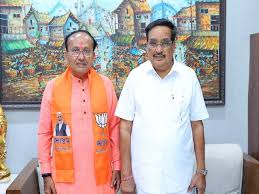
BJP candidate declared Unopposed in Surat
BJP candidate declared Unopposed in Surat
GS-2: Indian Polity
(IAS/UPPCS)
Relevant for Prelims:
Lok Sabha Elections-2024, Election Commission (EC), Article 329 (B), Section 33 of the Representation of the People Act, 1951 (RP Act).
Relevant for Mains:
Cases of unopposed election to Lok Sabha, legal provisions for nomination, legal path.
25/04/2024
Source: TH
Why in News:
The BJP’s candidate from the Surat Lok Sabha constituency in Gujarat has been declared elected unopposed in 2024 Lok Sabha elections.
- This follows the rejection of the nomination paper of the candidate set up by the Congress party and the withdrawal of nominations by other candidates.
What is the current issue?
- In the present case, the candidate of the Congress party for the Surat constituency Nilesh Kumbhani had filed three sets of nomination papers. The proposers for these three nomination papers were his brother-in-law, nephew and business partner. A BJP worker objected to Mr. Kumbhani's nomination alleging that the signatures of his proposers were not genuine. The RO also received affidavits from the proposers claiming that they had not signed the nomination papers of the candidate. He sought reply/clarification from the candidate within a day on the objections raised. As the proposers could not be produced before the RO within the stipulated time for scrutiny, all three sets of nomination papers were rejected.
- The election rules allow for a substitute candidate to be fielded by a political party. The nomination of this substitute candidate would be accepted if the nomination of the original candidate is rejected. In this case, the Congress party had fielded Suresh Padsala as its substitute candidate. However, the nomination paper of the substitute candidate was also rejected for the same reason, that is of the proposer's signature not being genuine. The other nominations were either rejected or withdrawn paving the way for BJP candidate Mukesh Dalal to be declared winner.
Cases elected unopposed to Lok Sabha:
- Since 1951, there have been at least 35 candidates who have won parliamentary elections without opposition, including Mr. Dalal, who recently won a seat in the 18th Lok Sabha.
- Other notable personalities who won unopposed include Samajwadi Party's Dimple Yadav, who won the Kannauj Lok Sabha by-election in 2012. Her husband Akhilesh Yadav had vacated the seat after becoming the Chief Minister of Uttar Pradesh.
- YB Chavan, Farooq Abdullah, Hare Krishna Mahtab, TT Krishnamachari, PM Sayeed and SC Jamir are among the other prominent leaders who have won parliamentary elections without opposition.
- Most of the candidates who have entered the Lok Sabha without any competition have been from the Congress Party. There have been two such unopposed elections each in Sikkim and Srinagar constituencies.
- While most of the candidates have won unopposed in the general or regular elections, there are at least nine, including Dimple Yadav, who have won unopposed in the by-elections.
- In 1957, a maximum of seven candidates won unopposed in the general elections, followed by five candidates each in 1961 and 1967 elections. Three candidates won unopposed in 1962 and two candidates in 1977. Similarly, in 1971, 1980 and 1989, one candidate each won the elections unopposed.
Reaction of other parties:
- However, in the present case, the Congress party has alleged that the proposers were forced to retract their signatures. It has approached the Election Commission (EC) seeking to quash the RO's decision and restart the election process.
Election Commission reaction:
- However, it is unlikely that the Election Commission will act on this request as Article 329(b) of the Constitution read with the RP Act provides that no election shall be questioned except in an election petition before the concerned High Court.
What is the law for nomination?
- Section 33 of the Representation of the People Act, 1951 (RP Act) contains the requirements for a valid nomination.
- As per the RP Act, an elector above 25 years of age can contest Lok Sabha election from any constituency in India. The proposer(s) of the candidate should however be elector(s) from that respective constituency where the nomination is being filed.
- In case of a recognised party (national or State), the candidate needs to have one proposer.
- Candidates set up by unrecognised parties and independents need to be subscribed by ten proposers.
- A candidate can file up to four nomination papers with different set of proposers.
- This is to enable the acceptance of nomination of a candidate even if one set of nomination paper is in order.
- Section 36 of the RP Act sets out the law with respect to the scrutiny of nomination papers by the Returning Officer (RO).
- It provides that the RO shall not reject any nomination for a defect that is not of a substantial character. However, it specifies that signature of the candidate or proposer found not genuine is grounds for rejection.
What is the legal path?
- In case of discriminatory and unfair rejection of nomination papers by the Returning Officer, an election petition can be filed in the High Court.
- There is a provision in the RP Act that the High Court can investigate such cases within six months, although cases related to cancellation of nomination have not been disposed of by the courts within this time limit in the past.
- To complete the electoral process in the country democratically, expeditious disposal of election petitions would be a right step.
-----------------------------------------------------
Mains Question
Discuss the provisions related to a candidate elected unopposed in the Public Representation Act, 1951.